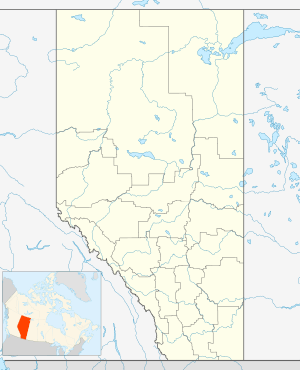Holden, Alberta
| Holden | |
|---|---|
| Village | |
| Village of Holden | |
 Main street | |
| Motto(s): Share the Charm of Country Living | |
 Holden | |
| Coordinates: 53°13′59″N 112°14′6″W / 53.23306°N 112.23500°WCoordinates: 53°13′59″N 112°14′6″W / 53.23306°N 112.23500°W | |
| Country |
|
| Province |
|
| Region | Central Alberta |
| Census Division | No. 10 |
| Municipal district | Beaver County |
| Incorporated[1] | |
| • Village | April 14, 1909 |
| Government[2] | |
| • Mayor | Mark Giebelhaus |
| • Governing body | Holden Village Council |
| • CAO | Katherine Whiteside |
| • Deputy Mayor | Douglas Hanson |
| Area (2016)[3] | |
| • Land | 1.74 km2 (0.67 sq mi) |
| Elevation | 686 m (2,251 ft) |
| Population (2016)[3] | |
| • Total | 350 |
| • Density | 200.9/km2 (520/sq mi) |
| Time zone | UTC-7 (MST) |
| • Summer (DST) | UTC-6 (MDT) |
| Postal Code | T0B 2C0 |
| Area code(s) | 780 |
| Highways |
14 855 |
| Waterways | Creeks in the area form the head of Vermilion River |
| Website | Official website |
Holden is a village in central Alberta, Canada. It is located south of Vegreville. The village is named after former Alberta MLA James Holden.
Demographics
In the 2016 Census of Population conducted by Statistics Canada, the Village of Holden recorded a population of 350 living in 146 of its 167 total private dwellings, a change of −8.1% from its 2011 population of 381. With a land area of 1.74 km2 (0.67 sq mi), it had a population density of 201.1/km2 (521.0/sq mi) in 2016.[3]
In the 2011 Census, the Village of Holden had a population of 381 living in 182 of its 213 total dwellings, a change of -4.3% from its 2006 population of 398. With a land area of 1.7 km2 (0.66 sq mi), it had a population density of 224.1/km2 (580.5/sq mi) in 2011.[4]
Notable people
- Dale Armstrong, drag racer
- Ted Newall, businessman
See also
References
- ↑ "Location and History Profile: Village of Holden" (PDF). Alberta Municipal Affairs. October 21, 2016. p. 372. Retrieved October 23, 2016.
- ↑ "Municipal Officials Search". Alberta Municipal Affairs. September 22, 2017. Retrieved September 25, 2017.
- 1 2 3 "Population and dwelling counts, for Canada, provinces and territories, and census subdivisions (municipalities), 2016 and 2011 censuses – 100% data (Alberta)". Statistics Canada. February 8, 2017. Retrieved February 8, 2017.
- ↑ "Population and dwelling counts, for Canada, provinces and territories, and census subdivisions (municipalities), 2011 and 2006 censuses (Alberta)". Statistics Canada. 2012-02-08. Retrieved 2012-02-08.
External links
This article is issued from
Wikipedia.
The text is licensed under Creative Commons - Attribution - Sharealike.
Additional terms may apply for the media files.
